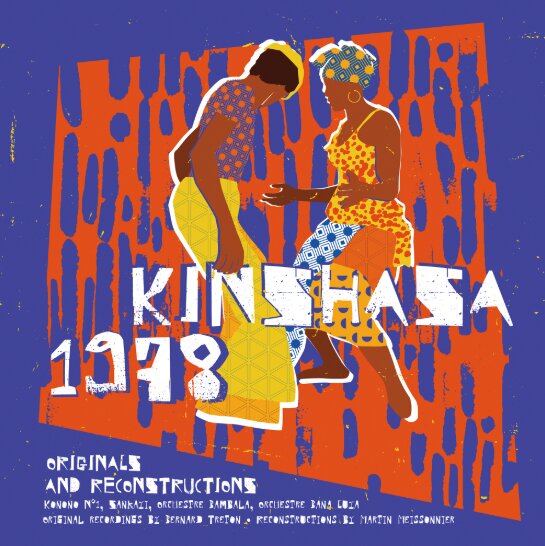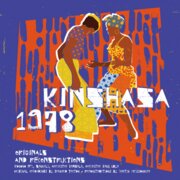
Songs
- artist:MARTIN MEISSONNIER
- release year:2019
- style(s):Afro
- country:Congo (Democratic Republic of the)
- formats:Audio File / Digital, CD (Compact Disc), LP / Vinyl
- record posted by:Run Productions
- label:Crammed Discs
- buy this record
Links
A double album, containing previously-unreleased recordings of 4 Kinshasa bands (Konono N°1, Sankayi -which later became part of the Kasai Allstars collective- Bana Luya and Orchestre Bambala) made over forty years ago by former Radio France producer Bernard Treton, as well as new reconstructions by renowned producer Martin Meissonnier.
Back in 1978, Bernard Treton recorded four 'tradi-modern' bands in Kinshasa. These sessions spawned the "Zaïre: Musiques Urbaines à Kinshasa" album (released in 1986 by the Ocora label), a record which, for the first time, presented to Western audiences the electrifying music which was later to be known as "Congotronics".
This new, twofold album comprises 80 minutes worth of previously-unreleased original recordings made during these 1978 sessions, as well as brand-new reconstructions made by Martin Meissonnier, the highly-respected French producer who worked with the likes of Fela Kuti, Haruomi Hosono & many more, and who has recently resumed his DJ activities.
The album comes as a vinyl LP with the Martin Meissonnier reconstructions, while the previously-unreleased recordings from 1978 appear on a CD which is enclosed in the vinyl cover.
The four bands
Konono N°1 and their now-legendary electric likembes (thumb pianos) have been massively adopted by the international electronica, world music and alternative rock scenes since the release of their Congotronics album in 2004. The raw ingredients of their sound were already there, back in 1978: the distortion generated by DIY amplification, the driving rhythms, the percussion instruments built from junkyard stuff.
Like Konono, the other bands featured here include musicians who left the bush to settle in the capital, and had to resort to makeshift electrification of their instruments in order to make themselves heard in the urban din. Which in turn created a radical mutation of their sound, of their technique and their repertoire. They all draw on traditional music, which they've modified and amplified.
Orchestre Bana Luya were Luba people, originally from Mbuji Mayi (in the Eastern Kasai region). The band was founded in 1967, and also used an array of electric likembes. Incidentally, Kabongo Tshisense, founder of the band Masanka (which would later merge with Sankayi and join the Kasai Allstars collective) was part of the band during these sessions.
Sankayi were led by the great Mbuyamba Nyuni, a singer, dancer, story-teller, and player of the giant, sled-like amplified bass likembe. Mbuyamba too went on to be one of the founding members of the Kasai Allstars collective, around the year 2000, and sadly passed away in 2011. On this recording, Sankayi used several likembes, percussion, and a bottle for playing the clave-like pattern which is emblematic of Kasaian music.
Orchestre Bambala consists of musicians from the Mbala ethnic group, originating from the Bandundu province. Their typical, joyful accordion-led songs were played at social events : baptisms, weddings, and also funerals.
Martin Meissonnier
After starting out as a musician and a concert promoter at the tender age of 18, and a music journalist for Libération and France Musique (and later a DJ on Radio Nova), Martin became a prominent producer and worked on albums by Fela Kuti, King Sunny Adé, Don Cherry, Tony Allen, Khaled, Manu Dibango, Yasuaki Shimizu, Haruomi Hosono & many more. In 1989, he created Megamix , a one-hour TV show about music around the world, and directed 220 episodes which ran on ARTE and other television channels. Martin then directed over 20 documentary films (mostly for ARTE and Canal+), on subjects ranging from music to politics, digital arts and history (including a film about depleted uranium, which he later turned into a book).
Martin Meissonnier has recently resumed his activities as a DJ. He appeared at several festivals across Europe during the last few months (including a great set at Transmusicales 2018). He was familiar with Bernard Treton's 1978 sessions, and asked him for some original recordings which he remixed for inclusion in his DJ sets. Four of these mixes are now appearing on this LP, while the massive, 45-minute extended version of Sankayi's "Il ne faut pas intervenir" will be made available exclusively on Bandcamp.
The story of the original recordings
Bernard Treton was a producer and technician with Radio France. In 1978, he was working temporarily in Kinshasa for Congolese radio La Voix du Zaïre, helping to train young sound engineers. Thinking it would be more fun to get them to record live bands, he asked his local percussion teacher, Maître Nono, to introduce him to some musicians. While attending a wedding, he met Sankayi leader Mbuyamba Nyuni, which led him to record four different bands, with the help of his students and of another French sound engineer, Guy Level. The sessions took place at the bands' respective rehearsal venues, and also involved a lot of dancing, eating and drinking. The recordings were made with a portable Nagra machine and a small 6-way mixer.
When he returned to Paris, Bernard (who had produced the recordings on his own initative and with his own resources) selected 4 tracks and offered them to the Ocora label, who released them in 1986, as a double-pack cassette (and, in '87, on a CD) entitled "Zaïre: Musiques Urbaines à Kinshasa".
Reactions were moderate: it seems that most of the audience and media which were interested in 'traditional' music at the time found the music too strange, mostly because of the gritty sound of the electrified likembes.
Enter Belgian musician, producer (and close Crammed associate) Vincent Kenis, a great connoisseur of Congolese music. He had heard an excerpt of Bernard's recordings of Konono N°1 in a radio program on France Culture, sometime in the early '80s, and was totally enthralled by the music. On the occasion of several trips to the Congo, Vincent started to relentlessly look for Konono N°1, who were nowhere to be found. He ended up locating them around the year 2000.
The rest is history: Kenis records and produces Konono N°1's Congotronics album (2004) *, and fosters the creation of the spectacular Kasai Allstars collective (including Sankayi's Mbuyamba and Bana Luya's Kabongo), whose albums he produces. These two bands go on to conquer the indie rock & electronic music audiences in Europe, America and Japan, and end up collaborating with the likes of Björk, CocoRosie, Herbie Hancock, Animal Collective, Deerhoof… who have all fallen equally in love with the wild rhythms and buzzing electrified likembes first introduced… by Bernard Treton's 1978 recordings!
The four original recordings included in the album are part of Bernard Treton's original sessions.
They were never released or heard prior to this release.
All royalties generated by this album will be donated to Doctors Without Borders
* Stop press: this Konono N°1 album appears in the list of "the 100 best albums of the 21st century", compiled by 45 British music critics and published in The Guardian in September 2019.
Track listing
Reconstructions (on the vinyl LP)
A1. Sankayi : Il ne faut pas intervenir (15:47)
A2. Konono N°1 : Roots of K (06:20)
B1. Orchestre Bambala : Animation Kifuti (07:29)
B2. Orchestre Bana Luya : Animation (15:33)
Originals (on the enclosed CD)
1. Konono N°1 : Kin 78 One (28:05)
2. Orchestre Bana Luya : Kin 78 Two (15:03)
3. Orchestre Bambala : Kin 78 Three (12:06)
4. Sankayi : Kin 78 Four (22:25)


